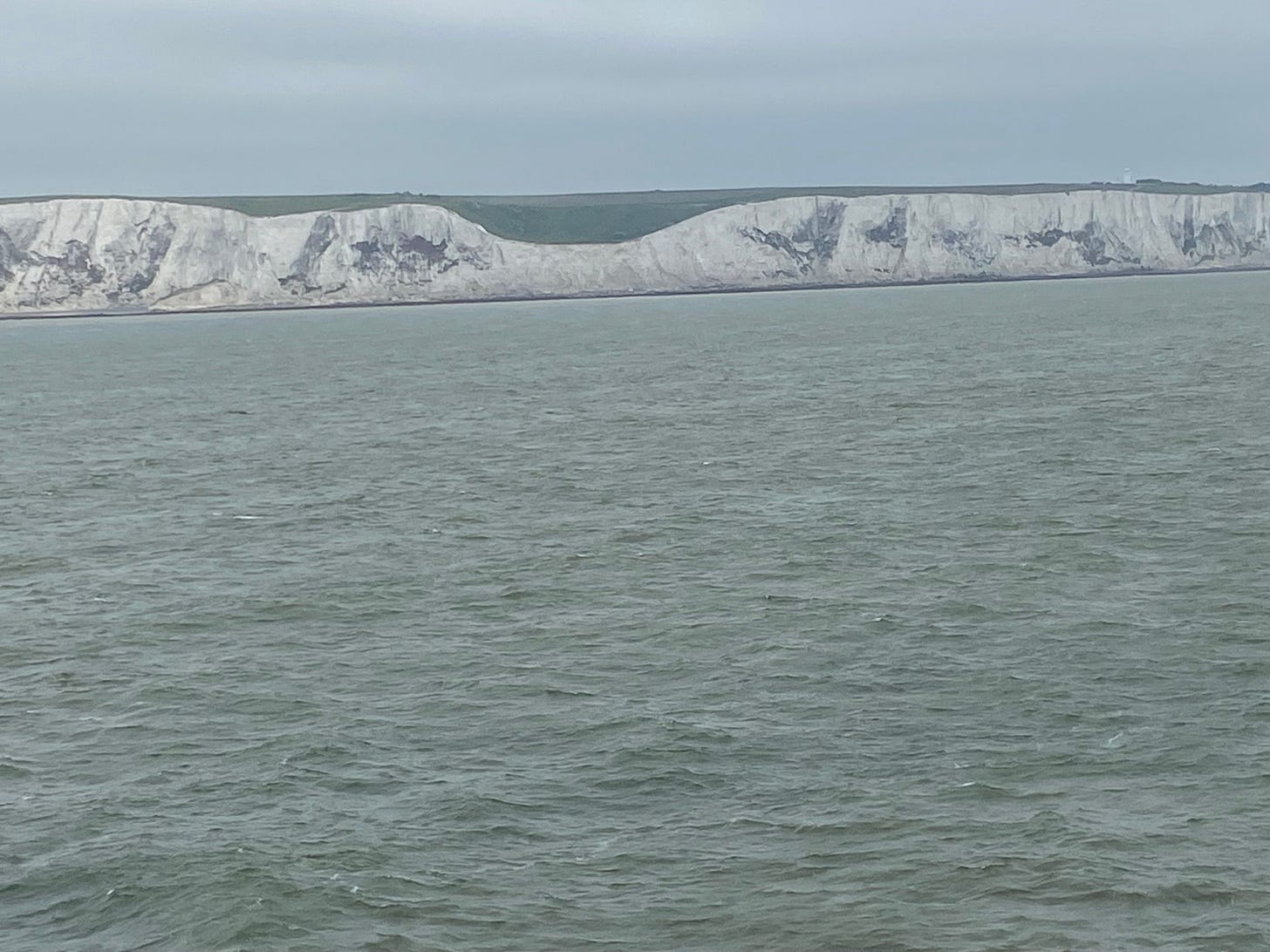Darkling Plains and Ignorant Armies
Dover Beach and the exhilarating melancholy of living in uncertain times
The tall, white cliffs hold back the beating of the ocean, as they ever have, and I finally got to see it for myself.
I've wanted to travel to Dover, England for many years, ever since I read and fell in love with Matthew Arnold's poem, "Dover Beach." The poem is a standard of English lit textbooks and all the readings are already done. The analyses have all been written and there is nothing new that anyone can add to the collective understanding of the poem. The only thing left to do with it just experience it, which, quite frankly is probably all we should be doing with art anyway.
From now on, my experience with the poem will be inseparable from my experience in the town of Dover. In Arnold's day, it was a go-to vacation spot, where many couples spent their honeymoons. Today, it's a bit scruffy, a fact which made it one my favorite places on my recent tour of Scotland, England, and France. I guess I'll never completely wash the working class off myself, so I'm naturally drawn to rusting places that are past their sell-by date. You can take the boy out of Cleveland, but you can't take the Cleveland out of the boy, I suppose.
At any rate, Dover Beach is certainly not the same place that Arnold wrote about in the middle of the Nineteenth Century.
But walking along the beach was still stunning for me. In the waters of the English Channel, great ships come and go. Many carry semi-trucks (or lorries, as the British say -- I'm going to start referring to the coal trucks of Western PA as "coal lorries" from now on). Many of these boats carry passengers. I myself took one to Calais, France (the finest way to travel, in my experience). This voyage offered me my best view of the cliffs:
The beach is rocky and I brought a stone home (my precious worry-stone collection grows). My feet passing across this beach created their own "grating roar." From that beach, if you walk along far enough, you see the grand white cliffs, what Arnold called "the naked shingles of the world," in the poem. They are magnificent.
Part of their allure for me is the knowledge -- no, the experience -- of being where Arnold was. I couldn't help thinking about what he thought about when he was there. The cycles of life, the predictable changing of the world, the passing away of one thing and the coming of another, and the anxiety of living through such times. All this swept over me as I saw the white cliffs of Dover for the first time.
I also thought about how right Arnold is for our time, a thought that made me sad because no figure could be less fashionable or attractive to people living in the zeitgeist of our current moment. Everyone is full of passionate intensity (as Yeats might have said) and too in love with certainty. We are all certain that we are right and that those who are wrong are monstrous because of it. Arnold preferred contemplation to confident action, and what could be less tolerable to our world today?
When I think of the poem, I most remember, as everyone does, the final striking lines:
And we are here as on a darkling plain
Swept with confused alarms of struggle and flight,
Where ignorant armies clash by night.
Is there a better way to describe the culture war that we wage, on this thing now, some other thing later? Have we not all sworn loyalty and fixed our identities with one or another of the ignorant armies clashing by night?
Dover may have changed, but we all still live on Dover Beach, just as Arnold described it.








Lovely piece (and full of love). Am I seeing things or does Arnold look like a young Bruce Springsteen in that side profile shot? Something about the set of his mouth (and the mutton chops of course).
Beseeched His Royal Majesty on your behalf, Danny, whereupon he has most graciously granted you post-hoc authorisation for the removal and reassignment of a fragment of this Blessed Realm to the proximate former colony under the proviso that you continue to wax eloquent over the wonders of These Isles, the poetically declining Christian character of which may, in the event, be greatly exaggerated.